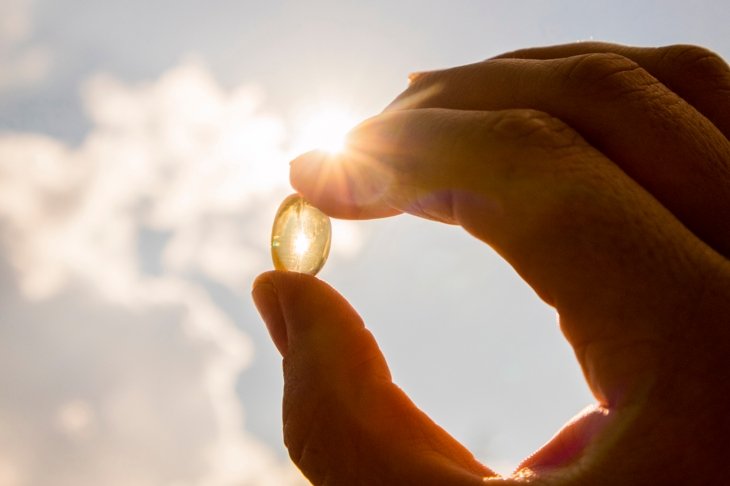
The term “pre-existing conditions” was arguably one of the most ominous buzz phrases of 2020. Chronic health problems such as diabetes, obesity, and heart disease—previously considered to be primarily long-term health concerns—put people in immediate jeopardy of dire COVID-19 complications.
One condition that came to light as the pandemic unfolded was vitamin D deficiency, with studies suggesting a potential link between low vitamin D levels and poor COVID-19 outcomes. Supplementation with vitamin D had already been shown to reduce the incidence of more familiar upper respiratory tract infections, such as cold and flu. However, the notion that something as simple as correcting a common nutrient deficiency could be potentially life-saving was a paradigm shift.
Co-pilots
No nutrient works in isolation. For many aspects of well-being, notably bone and heart health, vitamin D teams up with vitamin K. Some of the same chronic illnesses that predict poor COVID prognosis also happen to be associated with reduced vitamin K status.
Perhaps not coincidentally, low levels of vitamin K have been identified as a potentially critical factor in deadly COVID-19 symptoms of lung damage and blood clots. And since so many people supplement with vitamin D, understanding how it collaborates with vitamin K—specifically vitamin K2—may be a critical piece to the puzzle of foundational health as we move toward a (fingers crossed) post-pandemic world.
Balancing act
At the simplest level, vitamin D facilitates calcium absorption, while vitamin K2 directs that calcium toward bones and away from blood vessels. This particular synergy also means K2 may play a role in safeguarding against potential ill effects of excess vitamin D-induced calcium absorption, such as by restoring flexibility to hardened arteries.
Digging deeper, vitamin D stimulates the production of metabolic proteins that remain essentially inactive until vitamin K2 flips their switch to “on.” Vitamin D encourages the action of bone-building cells, while vitamin K2 reins in the action of bone breakdown cells, a balance central to maintaining bone density. The combination of D and K2 together appear to help make bones both stronger and more flexible.
This may be especially important for children’s health, since growing bones need vitamin K2 to effectively incorporate calcium into healthy bone architecture. A mere 45 mcg of vitamin K2 has been shown to boost markers of bone health status in healthy children. This modest amount can easily be met with a daily serving of the right kind of cheese (see sidebar).
Homing in on immune health, both vitamin D and K2 play a role in healthy lung function, with D modulating immune response to respiratory pathogens, while K2 is believed to help protect elastic tissues that give lungs their ability to expand and contract.
Clearing up vitamin K confusion
Vitamin K is not a singular vitamin but is actually a small family of vitamins largely represented by the siblings K1 and K2. While it’s rare to be deficient in vitamin K1, as with vitamin D, researchers believe that inadequate levels of vitamin K2 may be common. Vitamin D is mostly derived from sun exposure, with fatty fish being one of the very few food sources, so low levels are no mystery.
The reasons behind a potential low vitamin K2 status are a little more complex. Some animal-based fare, namely egg yolks and butter, contain a pinch of K2. Certain fermented foods that are underrepresented in the North American diet, such as specific cheeses, are rich in vitamin K2 because some (but not all) bacteria have the ability to synthesize the vitamin.
Vitamin K2 supplements are readily available at your local health food store. You can get the scoop on different forms of vitamin D in the Q&A at alive.com/webexclusive.
From pandemic to endemic
More of us are thinking about the big picture of health resilience now. Exercise, better nutrition, and reducing the body’s contaminant load through detox are all parts of the solution. Topping up with key nutrients may prove inexpensive insurance against health vulnerabilities.
To be clear, no nutrient has yet been definitively proven to prevent or treat COVID-19. There has been barely a year to investigate the issue, and clinical trials are ongoing. In the meantime, there’s no downside to making sure we are getting adequate amounts of specific nutrients that have been shown to partner up for many aspects of health.
Eat cheese. Feel virtuous.
These ones are brimming with vitamin K2:
- pecorino
- Munster
- Camembert
- Gouda
- Brie
- Jarlsberg
- Emmental
- Edam
- Stilton
Good news for plant-based eaters: the food known to be highest in vitamin K2 is natto, a Japanese fermented soybean food.













